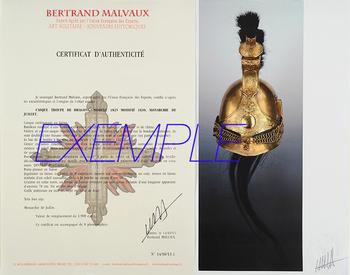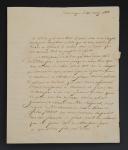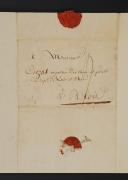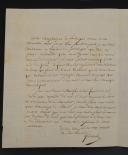
Spanish Campaign. AUTOGRAPH LETTER SIGNED GERBAUD addressed to MR. CROZAT, Inspector of Waters and Forests in the Loir-et-Cher department in Blois, Salamanca, May 20, 1811. 18855-2
Campaign in Spain. SIGNED AUTOGRAPH LETTER FROM GERBAUD ADDRESSED TO MR. CROZAT, Inspector of Waters and Forests of the Loir-et-Cher department in Blois, Salamanca, May 20, 1811. 18855-2
Officer Gerbaud is stationed in Spain. His letter is addressed to Mr. Crozat, Inspector of Waters and Forests of the Loir-et-Cher department. He laments the slowness of the exchanged messages. Following the decision of Marshal Duke of Ragusa* authorizing officers, non-commissioned officers, and soldiers engaged in Spain to return to France if they have infirmities preventing them from continuing the war, he informs that Mr. de Maupas**, with weak eyesight, will be returning to Blois soon. He also mentions the campaign in Portugal.
"I hasten to inform you that without a doubt Mr. de Maupas will arrive almost at the same time as my letter in Blois, because Marshal Duke of Ragusa, who commands our army since the departure of the prince, has authorized the return to France of all officers, non-commissioned officers, and soldiers who, due to their infirmities, were incapable of continuing the war. Mr. de Maupas has weak eyesight and I believe he is retiring with his release. He is an officer generally esteemed in his regiment, he is regretted by his comrades, this is the most flattering tribute we can carry back to our families, I share in the pleasure that Mr. de Maupas will experience [...]
Our campaign in Portugal is old news so I will not speak to you about it. I have convinced myself with regard to Portugal that all these enchanted lands that are described in books as delightful abodes lose much of their charm when seen up close [...]."
H 22.6 cm x 18.5 cm. Double sheet. 2 pages. With address and red wax seals. Manuscript part in good condition, traces of folds, tear at one of the wax seals.
BIOGRAPHIES:
* Auguste Frédéric Louis Viesse de Marmont, Duke of Ragusa (1808), Marshal of the Empire (1809), and Peer of France (1814), was a French military leader born on July 20, 1774 in Châtillon-sur-Seine, and died on March 2, 1852, in Venice.
[... Commanding the army of Portugal (1811), he was seriously wounded during the Battle of Salamanca (1812), then actively participated in the 1813 German campaign, notably the Battle of Leipzig where he distinguished himself, and in the 1814 campaign in France. It was then that Marmont decided to abandon Napoleon and directly entered into negotiations with the enemy to hand over his entire army, thereby depriving the Emperor of any ability to retaliate. This defection forced Napoleon to abdicate and retreat to the island of Elba...]
The Spanish campaign (1811-1812)
On May 13, 1811, Marmont arrived with the army and took effective command. His first measure was to order the withdrawal of the Portuguese army. Indeed, Masséna, tasked with taking Lisbon, had concentrated the French army at the foot of the Torres Vedras lines, but as they were impassable, the French halted, awaiting possible reinforcements. Knowing that reinforcements were impossible, Marmont decided to withdraw the army to take a more secure position in Salamanca. On June 3, Marmont had his army abandon all positions and set out for Merida, where he arrived on the 18th. This flank movement aimed to link up with Marshal Soult’s army to lift the siege of Badajoz on June 20, thereby securing the entire south of Spain. With his maneuver, Marshal Marmont definitively abandoned the plan to conquer Portugal (perhaps he had received instructions from Napoleon to that effect before leaving Paris) and positioned himself in the Tagus Valley to defend the Spanish border. In mid-August, and again in September, Marmont had to maneuver to prevent Wellington's army from advancing into Spain, but without the need to engage in battle. By the end of September, he even managed to supply the city of Rodrigo, which was blocked by the English army. Taking advantage of the winter lull, Marmont spent a few days in Madrid with King Joseph. Since his arrival in Spain, Marmont had not been able to get along with the king whom he had known well before and during the Consulate. Their disagreement led to many conflicts. Marmont accused Joseph of doing nothing to defend the border, while the king accused Marmont, and the other marshals, of undermining his authority and thus favoring the Spanish rebellion. Throughout the Spanish War, the discord between the marshals and the King of Spain, as well as among the marshals themselves, was a major cause of the French failure.
Upon his return to his army, Marmont saw part of his troops recalled to France by Napoleon and also had to detach some regiments to participate in the taking of Valencia. But by January 1812, Marmont had to maneuver again to counter the advance of the Anglo-Portuguese army. The English avoided battle but managed to take Rodrigo at a time when the French army had moved away. At that time, Marmont requested, unsuccessfully, to be relieved of his command and recalled to France to participate in the upcoming Russian campaign. In mid-March, Marmont received orders to go on the offensive. Leading 25,000 men, he set out, tried to retake Rodrigo, laid siege to it, and advanced immediately to Sabugal in Portugal. During his advance, Marmont encountered only English cavalry and Spanish militias. Meanwhile, Wellington was maneuvering further south, towards Badajoz, which he took from the troops of Marshal Soult on April 18, 1812. Upon hearing this news, Marmont turned back and took up position around Salamanca on April 25. [...]
**Auguste-Marie Agard, Marquis de Maupas, born on September 5, 1786, in Laon (Aisne), and died on October 23, 1862, in Poissons (Haute-Marne), was a French military officer. Under the First Empire, he participated in the campaigns of Germany and Poland in 1806 and 1807. From 1808 to 1811, he fought in Spain and Portugal under the command of Masséna, Suchet, and Ney.
Officer Gerbaud is stationed in Spain. His letter is addressed to Mr. Crozat, Inspector of Waters and Forests of the Loir-et-Cher department. He laments the slowness of the exchanged messages. Following the decision of Marshal Duke of Ragusa* authorizing officers, non-commissioned officers, and soldiers engaged in Spain to return to France if they have infirmities preventing them from continuing the war, he informs that Mr. de Maupas**, with weak eyesight, will be returning to Blois soon. He also mentions the campaign in Portugal.
"I hasten to inform you that without a doubt Mr. de Maupas will arrive almost at the same time as my letter in Blois, because Marshal Duke of Ragusa, who commands our army since the departure of the prince, has authorized the return to France of all officers, non-commissioned officers, and soldiers who, due to their infirmities, were incapable of continuing the war. Mr. de Maupas has weak eyesight and I believe he is retiring with his release. He is an officer generally esteemed in his regiment, he is regretted by his comrades, this is the most flattering tribute we can carry back to our families, I share in the pleasure that Mr. de Maupas will experience [...]
Our campaign in Portugal is old news so I will not speak to you about it. I have convinced myself with regard to Portugal that all these enchanted lands that are described in books as delightful abodes lose much of their charm when seen up close [...]."
H 22.6 cm x 18.5 cm. Double sheet. 2 pages. With address and red wax seals. Manuscript part in good condition, traces of folds, tear at one of the wax seals.
BIOGRAPHIES:
* Auguste Frédéric Louis Viesse de Marmont, Duke of Ragusa (1808), Marshal of the Empire (1809), and Peer of France (1814), was a French military leader born on July 20, 1774 in Châtillon-sur-Seine, and died on March 2, 1852, in Venice.
[... Commanding the army of Portugal (1811), he was seriously wounded during the Battle of Salamanca (1812), then actively participated in the 1813 German campaign, notably the Battle of Leipzig where he distinguished himself, and in the 1814 campaign in France. It was then that Marmont decided to abandon Napoleon and directly entered into negotiations with the enemy to hand over his entire army, thereby depriving the Emperor of any ability to retaliate. This defection forced Napoleon to abdicate and retreat to the island of Elba...]
The Spanish campaign (1811-1812)
On May 13, 1811, Marmont arrived with the army and took effective command. His first measure was to order the withdrawal of the Portuguese army. Indeed, Masséna, tasked with taking Lisbon, had concentrated the French army at the foot of the Torres Vedras lines, but as they were impassable, the French halted, awaiting possible reinforcements. Knowing that reinforcements were impossible, Marmont decided to withdraw the army to take a more secure position in Salamanca. On June 3, Marmont had his army abandon all positions and set out for Merida, where he arrived on the 18th. This flank movement aimed to link up with Marshal Soult’s army to lift the siege of Badajoz on June 20, thereby securing the entire south of Spain. With his maneuver, Marshal Marmont definitively abandoned the plan to conquer Portugal (perhaps he had received instructions from Napoleon to that effect before leaving Paris) and positioned himself in the Tagus Valley to defend the Spanish border. In mid-August, and again in September, Marmont had to maneuver to prevent Wellington's army from advancing into Spain, but without the need to engage in battle. By the end of September, he even managed to supply the city of Rodrigo, which was blocked by the English army. Taking advantage of the winter lull, Marmont spent a few days in Madrid with King Joseph. Since his arrival in Spain, Marmont had not been able to get along with the king whom he had known well before and during the Consulate. Their disagreement led to many conflicts. Marmont accused Joseph of doing nothing to defend the border, while the king accused Marmont, and the other marshals, of undermining his authority and thus favoring the Spanish rebellion. Throughout the Spanish War, the discord between the marshals and the King of Spain, as well as among the marshals themselves, was a major cause of the French failure.
Upon his return to his army, Marmont saw part of his troops recalled to France by Napoleon and also had to detach some regiments to participate in the taking of Valencia. But by January 1812, Marmont had to maneuver again to counter the advance of the Anglo-Portuguese army. The English avoided battle but managed to take Rodrigo at a time when the French army had moved away. At that time, Marmont requested, unsuccessfully, to be relieved of his command and recalled to France to participate in the upcoming Russian campaign. In mid-March, Marmont received orders to go on the offensive. Leading 25,000 men, he set out, tried to retake Rodrigo, laid siege to it, and advanced immediately to Sabugal in Portugal. During his advance, Marmont encountered only English cavalry and Spanish militias. Meanwhile, Wellington was maneuvering further south, towards Badajoz, which he took from the troops of Marshal Soult on April 18, 1812. Upon hearing this news, Marmont turned back and took up position around Salamanca on April 25. [...]
**Auguste-Marie Agard, Marquis de Maupas, born on September 5, 1786, in Laon (Aisne), and died on October 23, 1862, in Poissons (Haute-Marne), was a French military officer. Under the First Empire, he participated in the campaigns of Germany and Poland in 1806 and 1807. From 1808 to 1811, he fought in Spain and Portugal under the command of Masséna, Suchet, and Ney.
Price :
70,00 €
| Destination | Envoi recommandé | Envoi Recommandé + Express |
|---|---|---|
| Shipping France | 9,00 € | 30,00 € |
| Shipping Europe | 17,00 € | 50,00 € |
| Shipping world | 30,00 € | 70,00 € |
Insurance (1%) :
0,70 €
Reference :
18855-2

Next update Friday, January 30 at 13:30 PM
FOR ALL PURCHASES, PAYMENT IN MULTIPLE CHECKS POSSIBLE
bertrand.malvaux@wanadoo.fr 06 07 75 74 63
SHIPPING COSTS
Shipping costs are calculated only once per order for one or more items, all shipments are sent via registered mail, as this is the only way to have proof of dispatch and receipt.
For parcels whose value cannot be insured by the Post, shipments are entrusted to DHL or Fedex with real value insured, the service is of high quality but the cost is higher.
RETURN POLICY
Items can be returned within 8 days of receipt. They must be returned by registered mail at the sender's expense, in their original packaging, and in their original condition.
AUTHENTICITY
The selection of items offered on this site allows me to guarantee the authenticity of each piece described here, all items offered are guaranteed to be period and authentic, unless otherwise noted or restricted in the description.
An authenticity certificate of the item including the description published on the site, the period, the sale price, accompanied by one or more color photographs is automatically provided for any item priced over 130 euros. Below this price, each certificate is charged 5 euros.
Only items sold by me are subject to an authenticity certificate, I do not provide any expert reports for items sold by third parties (colleagues or collectors).
FOR ALL PURCHASES, PAYMENT IN MULTIPLE CHECKS POSSIBLE
bertrand.malvaux@wanadoo.fr 06 07 75 74 63
An authenticity certificate of the item including the description published on the site, the period, the sale price, accompanied by one or more color photographs is automatically provided for any item priced over 130 euros. Below this price, each certificate is charged 5 euros.
Only items sold by me are subject to an authenticity certificate, I do not provide any expert reports for items sold by third parties (colleagues or collectors).


